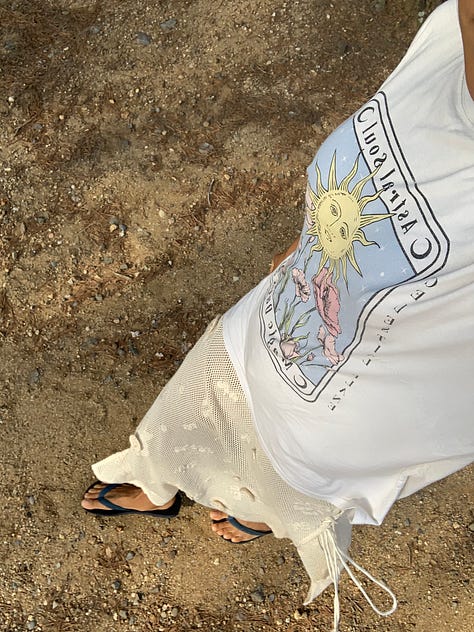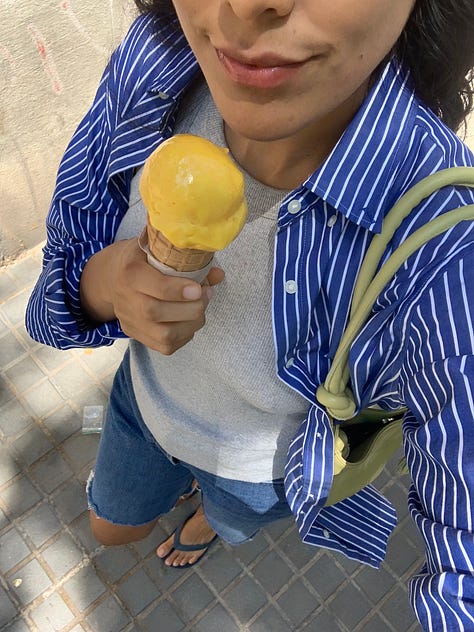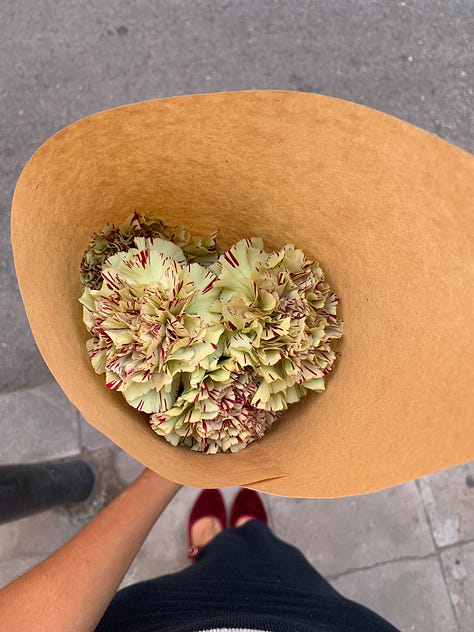I grabbed a paper and picked up my pen to draw. I sat silently for one minute, looking at the white page. I didn’t know what to draw, but I wanted to; that feeling when you want to do something but you don’t know where to start. My first thought was to jump on my mobile to look for inspiration. I knew I should give myself enough time to see what was cooking inside, but I gave up on my thoughts and grabbed my phone.
It was Sunday night, and just before I went to sleep, C came home; he spent the weekend away camping. I waited for him to go to bed too and tell me about his weekend. He woke up Saturday morning earlier than everyone else. His mobile had no battery, so he went to the nearest restaurant for breakfast. He got there and sat on the terrace, drinking his coffee; he had no one to talk to, nothing to read, and no phone to look at. There was no stimulus to provide him with information of any kind, and he just sat there and was where its feet were, and told me: Liz, I realized I want to get bored more; I remembered something I wanted to do for months but that I hadn’t even been given the space to think about how to do it.
“Don’t wait for inspiration. Remember. Do not wait for inspiration. You don’t need to be inspired to write a poem. You need to reach down and touch the thing that’s boiling inside of you and make it somehow useful.” —Audre Lorde
We live in an era of information. When we don’t know something, we have Google to answer us, and that is wonderful. I’m a big fan of finding information that travels as fast as my brain does and that gives me answers as fast as I need them. But I think the internet must be used with intention and healthy boundaries for our intuition and creative process to flourish. It’s hard when you are getting bombarded with information on how things should be done instead of finding your own answers or quickly jumping to type looking for inspiration because we want/need to get things done fast, but that is not the problem of the internet; the problem is our relationship with it; we are the ones that are using the tools, not the tools using us, and I think we sometimes forget this.
In The Artist Way, there is an interesting exercise, “The Reading Deprivation Week.” During that week, Julia Cameron invites us not to read books and observe how we sometimes use them as a distraction to not listen to our inner voice because we are consuming other people’s ideas all the time, and a mind full of information has no place for inspiration. When we create healthy boundaries with it, emptying our lives of distractions as she mentions, we are actually filling our creative well.
And I do not think all information is blocking our creative flow. I genuinely get so inspired by others—by reading, seeing, or hearing something that each of us channels into this world. I am enriched and expanded by that. And, like in everything, balance is key. If we constantly consume information, where will our ideas land if there is no space for them to flourish?






When I did “The Reading Deprivation Week” exercise, I adapted it to a 2024 version, which was more like “The Information Deprivation Week.” I didn't read books or long formats, I didn't go on Pinterest or Cosmos to look for inspiration, and I didn’t use Instagram. I moved away from everything that was filling my vessel with external information. Although it was uncomfortable not to give in to my impulses because when I’m feeling creatively blocked, looking for answers outside is the easiest route. By blocking all external information, whether online or offline, I was faced with finding inspiration within myself.
That week, I connected with my wisdom instead of looking for something external to guide me. When I didn’t know how to design a new proposal, I went on a walk. When I sat in front of the white page without knowing how to start writing, I danced. When I didn’t know what to paint, I put music on and let that guide me. Those days, I learned that ideas flow in a moving body, and when I feel creatively blocked, I find that what is best for me is to get out of my head and into my body.
The resources are there for us, and it’s best to use them with intention, knowing at what point in our creative process to introduce them or when to simply pass on them. Finding a flow that feels right for us and helps us reach down and touch the thing that’s boiling inside us.
RECOMMENDATIONS:
If you are interested in this topic, I found this TED Talk really interesting. In there, she explains how when you get bored, you ignite a network in your brain that is called “the default mode”. When we start to wonder or daydream, we start thinking beyond the conscious mind, a little bit onto the subconscious, which allows different connections to take place. By doing nothing, we are actually becoming our most creative and productive selves. So, having those boring/disconnection moments will be more helpful than filling ourselves with information.
After finishing this letter, I had an idea: to create a small accountability group to do "The Information Deprivation Week." if people are interested. I haven’t worked out all the details yet, but I believe that doing it in community could make the experience more supportive and easier to navigate. The goal would be to help each other explore our creative processes, find inspiration from within, and gain insights together, ultimately creating more space for our creativity. If this resonates with you, please respond to the poll or reply to this email if you're reading from your inbox.
Until next time,
Liz



Yes yes yes to all of this! Approaching it from the body rather than from the mind unlocks whole new levels! And I feel like it goes far beyond what has been researched so far. The body is such an infinite well of wisdom, connection and creativity (as it constantly creates and heals itself!). Thank you for this wonderful reminder, I really enjoy reading how others are doing on this path and your words just show how simple it really is.